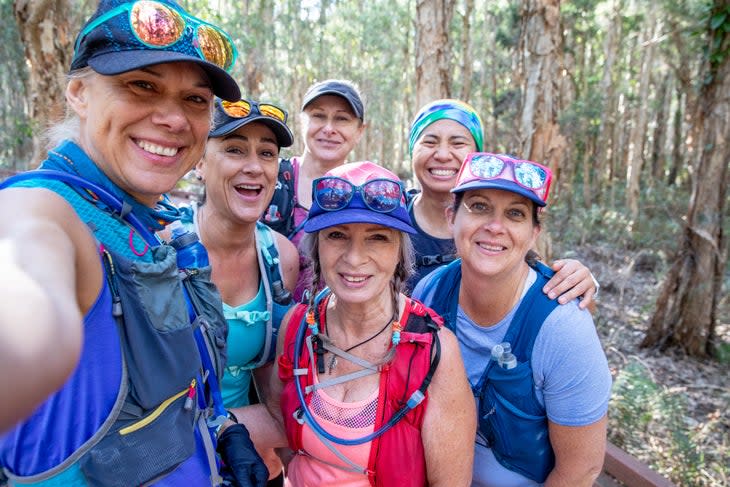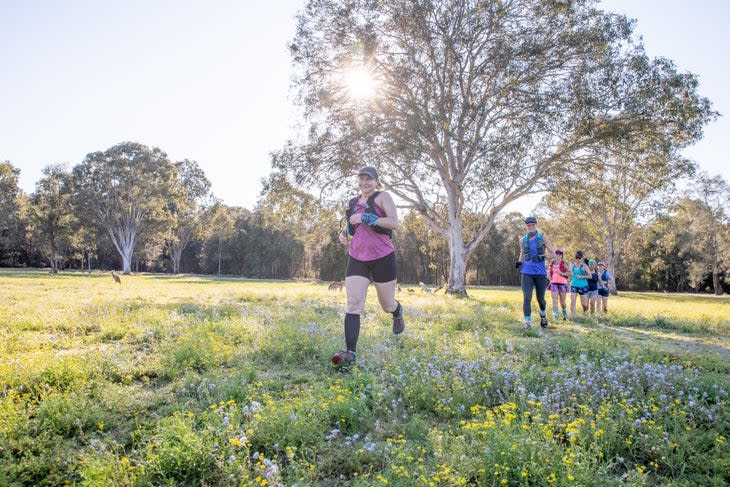Trail RX: Group Run Anxiety And Realistic Expectations for Beginners
This article originally appeared on Trail Runner
In our TrailRx column, we'll attempt to answer your burning, embarrassing and thought-provoking trail running questions. Whether you're looking for advice on gear, training or the best Oreo flavor (birthday cake) we'll have a prescription for you.
Q: I'm really nervous about going to group runs. I'm scared that I'll be too slow and get left behind or that I'm not enough of a runner to keep up.
I feel this, all the time. Is it rational? No. Has it kept me from attending group runs? Absolutely.
People who go to group runs are hopefully people who want to run in a group. So, likely they're showing up knowing they may need to alter their pace in exchange for good company. Most folks are prepared, willing and stoked to slow their roll for the chance to run with others!
It's likely that you're not the only one who's a bit nervous. BUT: if you're runner enough to be curious about joining a group run, you're runner enough to attend that group run. Full stop. And your attendance could make it that much more fun and welcoming for other folks who are nervous about showing up, too! If group runs were only made up of folks who felt 100% confident and comfortable, that would be a pretty boring group.
RELATED: Trail RX: Advice For Workout Anxiety
We tend to grossly overestimate how much people are paying attention to us and how fast we're running. We might think Oh no, is everyone looking at me and noticing how slow I am, or that my socks don't match and my leggings have dried queso on them?
They probably aren't.
In a study in the Journal of Personality and Social Psychology, researchers brought a group of students into a classroom to complete a task. One student was randomly assigned to don what they imagined to be an embarrassing bright yellow t-shirt, with a picture of Barry Manilow on it. The researchers asked the students to estimate what percentage of their peers noticed their embarrassing shirt, and the students estimated around 50%. In reality, less than a quarter of the students remembered the shirt at all. The people wearing the shirt drastically overestimated how many people actually noticed them.
Most people are preoccupied with the actual running or thinking about themselves. They have their own stuff to attend to.
Do some pre-run recon and find out if the run is no-drop or if there are break-out groups for specific paces. Show up a few minutes early, introduce yourself, and see if you can connect with some runners with a similar pace to yours. It's pretty hard to abandon someone when you're deep in conversation, so connect with someone else and strike up a conversation. Or, text a friend beforehand and invite them to join you. Having a buddy can help assuage the fear that you'll be left behind, and act as a bit of social lubricant when meeting new people, too!
Pro tip: NEVER apologize for your pace. How fast you run will not be an inconvenience in a truly welcoming space, and if there are other runners there slower than you (which there probably will be!) apologizing sends a pretty crappy message to them.
Here's the thing that a lot of runners have in common: We're all worried that we're secretly the slowest, or not as good as we might think. That anxiety we share should be a point of connection, not contention.
So, go to that group run! Rock that Barry Manilow shirt. You do you, and don't let what others think keep you from doing your thing.

What are realistic expectations on distance and speed for newbies?
When you're just getting started trail running, it can be tempting to set concrete goals and expectations for how far and how fast you "should" run. However, the weight of those expectations can be counterproductive. Focusing on trying to "get the miles in" can lead to feeling bedraggled and burnt out, especially as your energy will fluctuate over time.
To start out, focus on time, not pace and miles. Running too far or too fast when you're just getting started is a surefire way to end up injured. If you have a GPS watch, set up the face so that it only shows how long you've been running.
RELATED: Trail RX: Should Runs Be More Focused Or More Fun?
A mistake many newer (and also experienced!) runners make is focusing on pace rather than effort. You should be able to talk out loud, or even sing along to music. Slow down if your breathing gets ragged, or you feel out of breath. You should finish feeling like you could run a few more minutes if you had to.
Start out with a walk/run. Try running for three minutes, then walk for one. This can help you keep your breath and heart rate under control. Try this for a week or two until it feels comfortable, then aim for four-minute runs with one-minute walking recoveries.
Don't push yourself too hard too often. Building endurance takes time, so be patient, and have fun with it.

How do you deal with...chafing...down there?
Body glide. Lots of it.
Got questions? Email them to zrom@outsideinc.com
Zoe Rom is Editor In Chief of Trail Runner. When she's not running, she's writing, and when she's not climbing she's cooking or eating. Southern story-teller turned mountain-dweller, she starts every day with a cup of strong coffee and a good story. She currently hosts and produces the DNF Podcast.
For exclusive access to all of our fitness, gear, adventure, and travel stories, plus discounts on trips, events, and gear, sign up for Outside+ today.

